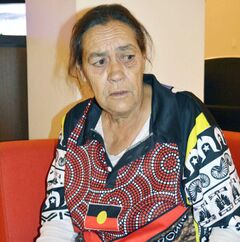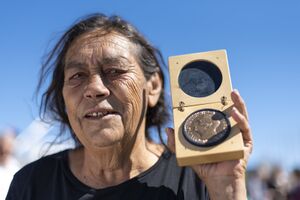Sue Coleman-Haseldine
( activist) | |
|---|---|
 | |
| Born | 1951 |
| Interests | • • |
Sue Coleman-Haseldine aka Aunty Sue is an activist and organiser from the Kokatha-Mula nation, an Aboriginal Australian people of the state of South Australia. She is a survivor of British nuclear weapons testing, and is the Australia ambassador of the International Campaign to Abolish Nuclear Weapons (ICAN), which was awarded the Nobel Peace Prize in 2017.[1]
Aunty Sue continues to defend the earth and sea of her homelands from mining, oil drilling and nuclear waste. Twice a year she “goes bush” with family and friends to care-take for her country, teaching the young ones about the plants and animals. Aunty Sue has inspired and mentored countless people over the years, and will continue to do so in her quiet, powerful and undeniably cheeky way.[2]
Contents
'Outlaw one'
According to anthropologist Eve Vincent:
Sue Coleman-Haseldine spent her childhood on the Koonibba Lutheran Mission, located approximately forty-five kilometres west of Ceduna. As a young woman she met Gary, whose family has farmed in this wheat-growing district since the early years of the twentieth century; in the late 1960s they danced together to the jukebox in a Greek café in the adjacent port town of Thevenard. Aunty Sue has raised six of her own children (one deceased), as well as ‘growing up’ a host of other kids, and is now a grandmother and great-grandmother. In her most recent phase of life she is proud to have earned a public identity on South Australia’s west coast as an activist and rebel – or, as she puts it, ‘outlaw one’.[3]
Campaigner
On 4 December 2017, Australia's National Indigenous Television (NITV) reported:
Sue Coleman-Haseldine was a toddler crawling around in the dirt when the winds brought the black mist. Her white nappies on the washing line were burnt.
It was in the 1950s when the British began testing nuclear weapons at Maralinga in the South Australian outback.
The legacy of the bombs dropped continues to haunt the 67-year-old Aboriginal grandmother.
"We weren't on ground zero at Maralinga, otherwise we would all be dead," she told AAP.
"I was born and grew up on a mission at Koonibba, but the winds came to us."
Ceduna, the main township before the Nullarbor, is the cancer capital of Australia, Ms Coleman-Haseldine says.
She's had her thyroid removed and will be on medication for the rest of her life. Her 15-year-old granddaughter is also battling thyroid cancer. There are birth defects and cancers right across the community.
"It's changed our genes," she said. "These diseases weren't around before the bombs."
On December 10, Ms Coleman-Haseldine will be in Oslo for the Nobel Peace Prize award ceremony, where the International Campaign to Abolish Nuclear Weapons (ICAN) is being recognised for its work to achieve a treaty-based ban on nuclear weapons.
ICAN, an alliance of non-government organisations that strongly advocate for an international nuclear weapon ban treaty, have collaborated with Aboriginal survivors of the Maralinga nuclear tests in South Australia, to raise awareness of the dangers of nuclear weapons.
"The experience of Indigenous survivors of nuclear testing in Australia and worldwide has played a crucial role in the campaign to ban and eliminate nuclear weapons", an ICAN spokesperson told NITV News at the time the Nobel Peace Prize win was announced.
"The testimonies of survivors and their descendants provide the frontline evidence for why these weapons of mass destruction have no legitimate role in our world."
So far, 122 countries have adopted the treaty, excluding Australia and countries with nuclear weapons - the US, UK, Russia, China, France, India, Pakistan, North Korea and Israel.
Only three countries have ratified the treaty and 50 are needed for it to become international law.
In Norway, Ms Coleman-Haseldine will tell the story of her people and their contaminated land.
"You've got to keep the past alive to protect the future," she said.
Ms Coleman-Haseldine hopes Australia will reverse its opposition and sign the treaty.
The Turnbull government has ruled that out but the Labor Party will debate the issue at its national conference next year.[4]
Activism on nuclear issues
Sue Coleman-Haseldine’s activism on nuclear issues began in 2005 when she joined the Australian Nuclear Free Alliance, of which she is now a Co-President. There she met with other Aboriginal people impacted by the nuclear fuel chain and learned more about the long-term harm caused by radioactive fallout. Members of ANFA have led many campaigns against uranium mining and nuclear waste, including the successful campaign to prevent a high-level international radioactive waste facility in South Australia in 2016.
In 2014, Sue travelled overseas for the first time in her life to speak to 158 governments at the Vienna Conference on the Humanitarian Impact of Nuclear Weapons. Her testimony told of the effects of the nuclear testing program on Aboriginal land, culture and people.[5]
Lead up to the treaty

During the lead up to negotiations for a Nuclear Weapon Ban Treaty, Sue Coleman-Haseldine participated in a national speaking tour, ‘Black Mist White Rain’, focusing on the impacts of nuclear testing. She travelled to four major cities in four days during April 2016 to speak alongside Yankunytjatjara-Anangu women Rose and Karina Lester and former Marshallese Senator Abacca Anjain-Maddison.
In March 2017 Sue travelled to the United Nations in New York to participate and speak at the negotiating conference for the Treaty on the Prohibition of Nuclear Weapons. The presence of First Nations nuclear test survivors from Australia, the Marshall Islands, Fiji and French Polynesia at the conference helped to enshrine the rights of victims and impacted environments in the final agreement. The Treaty was adopted by the UN on 7 July 2017 with the support of 122 nations.
2017 Nobel Peace Prize
ICAN was awarded the 2017 Nobel Peace Prize for its work raising awareness of the humanitarian impact of nuclear weapons and helping to achieve the Treaty on the Prohibition of Nuclear Weapons. Aunty Sue travelled to Oslo to celebrate and attend the award ceremony on 10 December 2017, taking the opportunity to call on the Australian Government to sign and ratify the historic new treaty.[6]
Progressive
| Aunty Sue's statement to the UN General Assembly 8 September 2021 |
Sue Coleman-Haseldine is a Council member of Progressive International, the international organisation uniting and mobilising progressive left-wing activists and organisations.[7]
On 8 September 2021, Aunty Sue addressed the UN General Assembly to commemorate and promote the International Day against nuclear weapons testing.[8]
References
- ↑ "Aunty Sue Coleman-Haseldine in Oslo"
- ↑ "Overview and early life"
- ↑ "Outlaw one – Defending identity in the native title area"
- ↑ "ICAN Nobel Peace Prize win shines spotlight on Maralinga horror"
- ↑ "Early work on nuclear disarmament"
- ↑ "The Treaty on the Prohibition of Nuclear Weapons"
- ↑ "PI Council members"
- ↑ "UN General Assembly Statement by Aunty Sue Coleman-Haseldine"